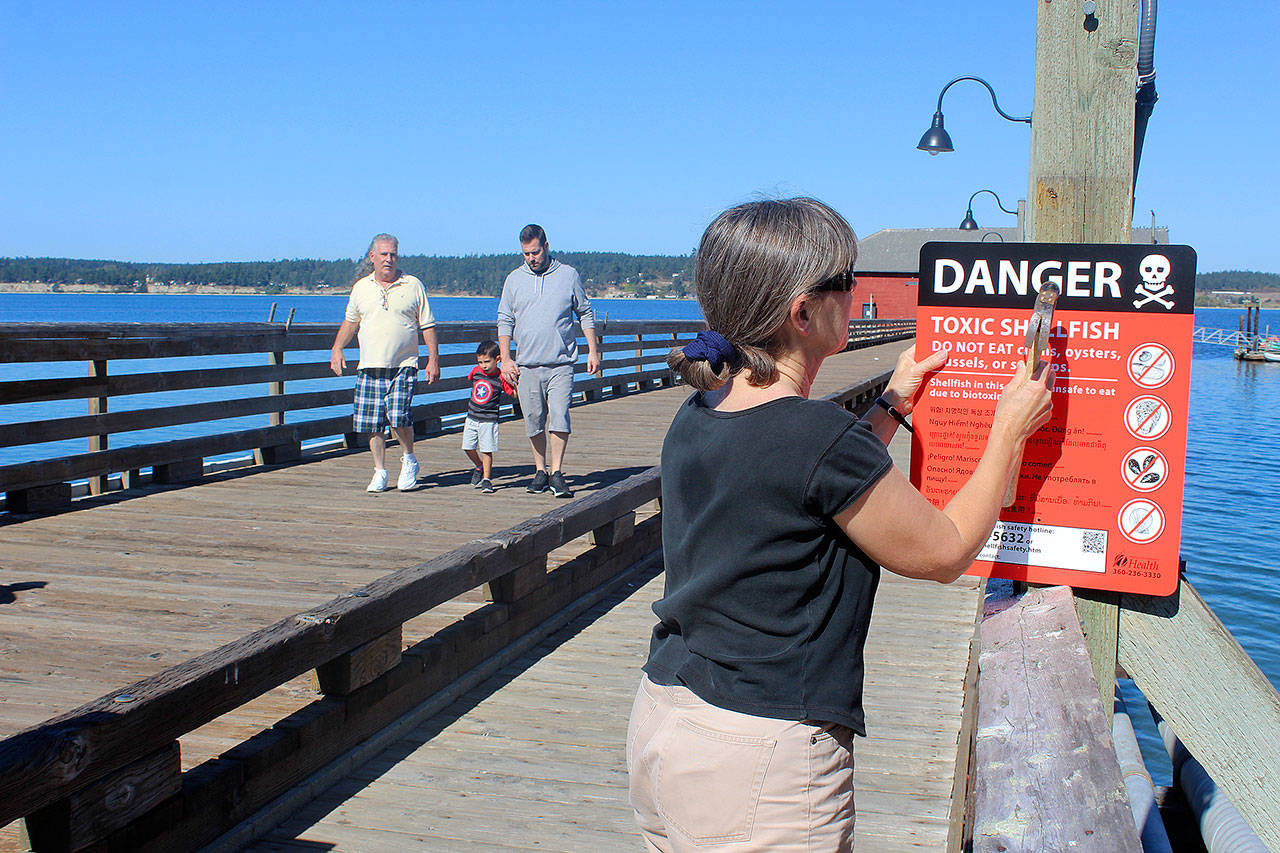Penn Cove is closed to all shellfish harvesting because of extremely high levels of paralytic shellfish poison, a potentially fatal biotoxin.
Wednesday, the state Department of Health added Penn Cove to its growing list of closed beaches around Whidbey Island when samples of mussels showed levels of the toxin 10 times above the safe standard.
The closure affects all recreational, commercial and tribal shellfish harvesters.
“These toxins can get you very sick or kill you,” warned Jerry Borchert, marine biotoxin specialist with the state health department. “Never eat shellfish from a beach when it’s closed.”
Penn Cove Shellfish is not currently harvesting blue mussels from its Penn Cove rafts. It moved its mussel operations to its Quilcene Bay site more than a week ago.
Paralytic shellfish poison, known as PSP, is considered the most dangerous marine biotoxin to humans. It’s not destroyed by cooking or freezing.
“The closure includes all species including clams, geoduck, scallops, mussels, oysters, snails and other invertebrates. Crab and shrimp are not included,” said Jill Dinehart Wood, county environmental health director.
The toxin has also forced beach closures along west Whidbey, Saratoga Passage and Camano Island in recent weeks.
Eating shellfish with high concentrations of PSP can affect a person’s nervous system and lead to paralysis and respiratory failure. The last reported case of the toxin causing illness in an Island County resident occurred in the 1970s, health officials said.
Large red warning signs were posted at Coupeville Wharf and at numerous popular clamming beaches around Penn Cove Wednesday and Thursday.
“I’ve covered eight areas so far,” said Maribeth Crandell, county environmental outreach specialist. “We haven’t had to close beaches for PSP for quite awhile, so I hope the public takes it seriously.”
Penn Cove Shellfish owner Ian Jefferds said the company stopped harvesting after its own testing showed levels were rising toward the unhealthy mark.
“We have to focus our operations at our other sites,” he said.
Mussels and other shellfish taken from Penn Cove prior to the closure are safe, both Jefferds and health officials said.
“Any shellfish you buy in a store or at a restaurant is safe to eat,” Borchert said. “We do extensive testing in Washington state to make sure of that.”
Paralytic shellfish poison is a naturally-occurring toxin that’s produced by some species of microscopic algae. It concentrates in shellfish but doesn’t harm them.
“This is totally natural, this toxin,” Borchert said. “It goes back to the late 1700s. It was around when Captain Vancouver was here. Three of his crewmen died eating (shellfish with) paralytic shellfish poison.”
What causes the toxin to occasionally explode in growth is not entirely known.
Some speculate the toxin thrived this summer because the dry, hot months offered ideal conditions for algae “blooms,” which is when it concentrates and grows dramatically. It then becomes a greater food source for shellfish and they accumulate it in their systems.
“It’s a bad year for PSP,” Borchert said. “We had flat water and lots of sunshine throughout the region, and it loves those conditions. We’re closing beaches throughout the San Juan Islands, Strait of Juan de Fuca, Kitsap, even the northern part of Hood Canal.”
September 2001 was the last time Penn Cove shellfish harvesting was closed because of high levels of PSP, officials said.
“It has been quite awhile since we’ve seen levels this high,” Borchert said. “The level we’re at right now is very serious. The (poisoning) can come on pretty quickly. This is nothing to take lightly.”
Early symptoms of paralytic shellfish poisoning are tingling sensation of the lips and tongue that progresses to fingers and toes. Loss of control of arms and legs, followed by difficulty breathing and a sensation of floating can also occur.
“A man who survived PSP told me it felt like his teeth were floating in his head,” Crandell said.
Immediate medical care is vital to surviving the poisoning.
“Call 911,” Borchert advised. “If you’re put on life support, you will survive as long as you’re getting oxygen.”
Penn Cove and other Whidbey beaches will remain closed to harvesting until two consecutive samples taken 7-10 days apart show results within the state’s safe standards.
• Most Whidbey Island beaches are closed for shellfish gathering now because of widespread biotoxins. Check the DOH Shellfish Safety Map for information.



